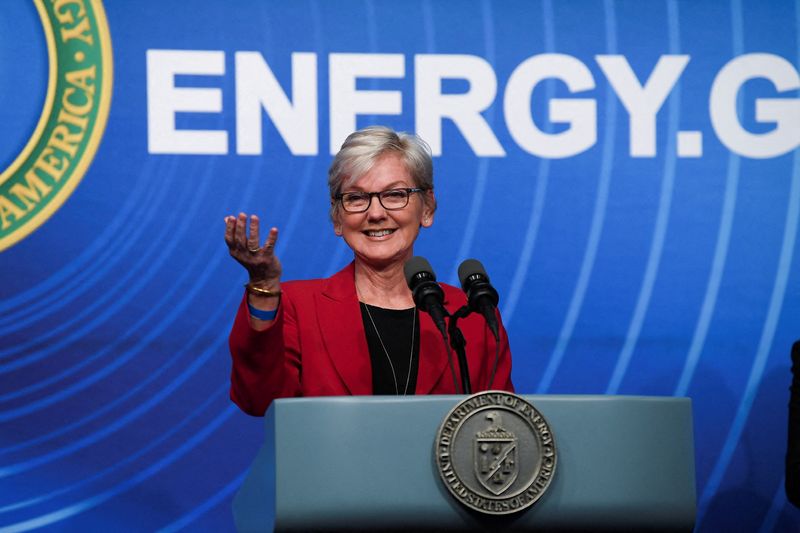By Nandita Bose and Jarrett Renshaw
WASHINGTON (Reuters) -U.S. Energy Secretary Jennifer Granholm warned Republicans in a letter seen by Reuters on Wednesday that limiting President Joe Biden's authority to tap the nation's oil reserves would undermine national security, cause crude oil shortages and raise gasoline prices.
Biden repeatedly tapped the Strategic Petroleum Reserve (SPR) last year to manage rising gasoline prices and disruptions to supply caused by Russia's invasion of Ukraine. The sales shrank the SPR to about 380 million barrels, the lowest level since 1984, raising concerns about energy security.
A bill called the Strategic Production Response Act, introduced earlier this month by Republican Representative Cathy McMorris Rodgers, would limit presidential authority in releasing oil from the strategic reserve, except in the case of a severe energy supply interruption.
McMorris Rodgers now chairs the House Energy & Commerce Committee, after Republicans took over the chamber this month from Democrats.
"This bill would significantly weaken this critical energy security tool, resulting in more oil supply shortages in times of crisis and higher gasoline prices for Americans," Granholm said in the letter to the House energy panel, first seen by Reuters.
The administration has faced bipartisan concern over the current levels of the emergency reserves. The letter represents the administration's latest efforts to defend its actions and ease concerns about the state of reserves.
Rodgers said in an email the committee was still reviewing the letter, but that the bill would have "absolutely no effect" on the department's emergency authorities regarding the oil reserve. She also said the department had mismanaged and depleted the SPR "with no real plan to refill it."
Granholm also cited estimates from the Treasury Department that the administration's use of the SPR had cut prices for American consumers at the pump by as much as 40 cents per gallon.
In March, Biden announced the sale of 180 million barrels of oil out of the SPR to combat surging gasoline prices that boosted inflation after the February invasion of Ukraine by Russia, the world's largest exporter of fossil fuels. The sales of the oil were spread out over months, ending in December.
A Department of Energy spokeswoman said at its current levels the reserve remained the largest in the world.
The White House has repeatedly argued such drawdowns were necessary to help lower gas prices and help Americans who were paying more than $5 per gallon in parts of the country. Prices have plummeted in recent months but disagreements over energy policy remain.
The SPR has largely been used to address supply concerns - such as in the wake of Hurricane Katrina in 2005 - and Republicans were dubious of Biden's efforts to use the reserves to help drive down U.S. gasoline prices, particularly ahead of critical midterm elections.
The new House bill would make Biden's authority conditional on him opening up more federal lands to oil and gas drilling at the same time, a long-held view of Republican lawmakers.
The Biden administration has no set plans to conduct further sales from the SPR, though some smaller sales required by legislation passed by Congress in prior years could occur this year.

The White House has criticized the legislation, calling it "backwards" and an attempt by House Republicans to help oil companies make more profits.
Under a court order, the Biden administration did allow for new leases on federal lands last year. However, many Republicans remain convinced that he wants to do away with fossil fuels and transition to an economy entirely reliant on renewable sources of energy like wind and solar.